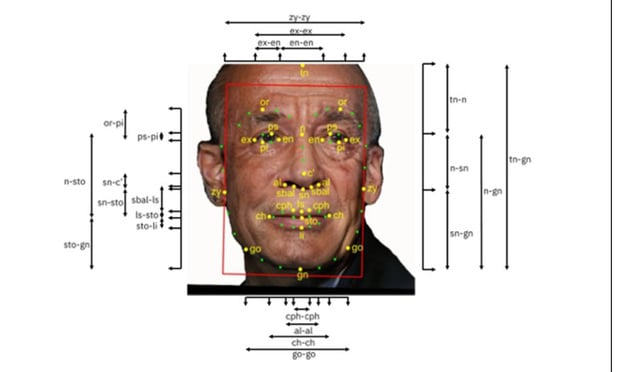Microsoft, Google and Amazon Face Privacy Suits Over Biometrics
The lawsuits target the companies' use of IBM's Diversity in Faces Dataset, developed to reduce racial and gender inaccuracies and biases in facial recognition technology.
July 15, 2020 at 07:08 PM
4 minute read
 According to the complaint, to build the Diversity in Faces Database, IBM extracted 19 facial landmark points from each image in the data set to determine 68 key points for each face. (Courtesy Photo)
According to the complaint, to build the Diversity in Faces Database, IBM extracted 19 facial landmark points from each image in the data set to determine 68 key points for each face. (Courtesy Photo)
Flickr users are alleging that Microsoft, Google and Amazon violated privacy laws when the companies used their images in a data set aimed to lessen the racial and gender biases in their facial recognition technologies.
In a trio of class action complaints, two Illinois residents allege that Microsoft, Google and Amazon violated the state's Biometric Information Privacy Act by using IBM's Diversity in Faces Dataset, made up of about 1 million Flickr images.
Loevy & Loevy and Carlson Lynch filed the lawsuits Tuesday in the U.S. District Court for the Northern District of California and the Western District of Washington.
The lawsuits were surfaced on Law.com's Legal Radar.
"In recent years, an 'arms race' has developed amongst for-profit companies seeking to become market leaders in the facial recognition arena," the attorneys wrote. "Critical to winning this battle has been to[sic] the ability to claim a low identification error rate—i.e., the for-profit companies want to herald the accuracy of their products, including accuracy in identifying woman[sic] and people of color." That's where IBM's Diversity in Faces Dataset comes in. IBM created the dataset to help minimize inaccuracies and biases in facial recognition technology and began offering the dataset to companies such as Microsoft, Google and Amazon.
The lawsuits allege that the companies improved their facial recognition products with biometric identifiers gleaned from images of Flickr users Steven Vance and Tim Janecyk, "thereby making those products and technologies more valuable in the commercial marketplace." Vance and Janecyk contend that the companies did not offer the proper disclosures and consents required by Illinois law. In addition to statutory damages of up to $5,000 per BIPA violation, the plaintiffs are asking the court for an injunction prohibiting the companies from continuing to use and profit from class members biometrics.
The lawyers underlined the tech companies' ties to Illinois, noting that Microsoft, for instance, "conducted extensive business within Illinois related to the facial recognition products it unlawfully developed using Plaintiffs' and Class Members' biometric identifiers and information." Underlining the companies' connection to Illinois could possibly be an attempt to circumnavigate issues related to standing and venue when litigating out-of-state BIPA complaints—issues that were raised in Facebook's facial recognition lawsuit in the Northern District of California.
A Microsoft spokesperson said the company is aware of the suit and reviewing it. "We take privacy seriously and we are committed to ensuring our AI technology is developed and used responsibly," the spokesperson said. Google and Amazon did not respond immediately to a request for comment Wednesday afternoon.
 Sign up for Law.com's Legal Radar to keep up with the latest news and lawsuits in a free, personalized news feed. Track class actions and who's getting the work by industry, practice area, law firm, company and region.
Sign up for Law.com's Legal Radar to keep up with the latest news and lawsuits in a free, personalized news feed. Track class actions and who's getting the work by industry, practice area, law firm, company and region.
This content has been archived. It is available through our partners, LexisNexis® and Bloomberg Law.
To view this content, please continue to their sites.
Not a Lexis Subscriber?
Subscribe Now
Not a Bloomberg Law Subscriber?
Subscribe Now
NOT FOR REPRINT
© 2025 ALM Global, LLC, All Rights Reserved. Request academic re-use from www.copyright.com. All other uses, submit a request to [email protected]. For more information visit Asset & Logo Licensing.
You Might Like
View All
'A Death Sentence for TikTok'?: Litigators and Experts Weigh Impact of Potential Ban on Creators and Data Privacy

‘Extremely Disturbing’: AI Firms Face Class Action by ‘Taskers’ Exposed to Traumatic Content
5 minute read

Patreon Hit With Lawsuit for Allegedly Diverting Subscriber Data to Meta
Trending Stories
- 1SDNY Criminal Division Deputy Chief Returns to Debevoise
- 2Brownstein Adds Former Interior Secretary, Offering 'Strategic Counsel' During New Trump Term
- 3Tragedy on I-95: Florida Lawsuit Against Horizon Freight System Could Set New Precedent in Crash Cases
- 4Weil, Loading Up on More Regulatory Talent, Adds SEC Asset Management Co-Chief
- 5Big Banks Did Great Last Year. What Does That Mean for Big Law?
Who Got The Work
J. Brugh Lower of Gibbons has entered an appearance for industrial equipment supplier Devco Corporation in a pending trademark infringement lawsuit. The suit, accusing the defendant of selling knock-off Graco products, was filed Dec. 18 in New Jersey District Court by Rivkin Radler on behalf of Graco Inc. and Graco Minnesota. The case, assigned to U.S. District Judge Zahid N. Quraishi, is 3:24-cv-11294, Graco Inc. et al v. Devco Corporation.
Who Got The Work
Rebecca Maller-Stein and Kent A. Yalowitz of Arnold & Porter Kaye Scholer have entered their appearances for Hanaco Venture Capital and its executives, Lior Prosor and David Frankel, in a pending securities lawsuit. The action, filed on Dec. 24 in New York Southern District Court by Zell, Aron & Co. on behalf of Goldeneye Advisors, accuses the defendants of negligently and fraudulently managing the plaintiff's $1 million investment. The case, assigned to U.S. District Judge Vernon S. Broderick, is 1:24-cv-09918, Goldeneye Advisors, LLC v. Hanaco Venture Capital, Ltd. et al.
Who Got The Work
Attorneys from A&O Shearman has stepped in as defense counsel for Toronto-Dominion Bank and other defendants in a pending securities class action. The suit, filed Dec. 11 in New York Southern District Court by Bleichmar Fonti & Auld, accuses the defendants of concealing the bank's 'pervasive' deficiencies in regards to its compliance with the Bank Secrecy Act and the quality of its anti-money laundering controls. The case, assigned to U.S. District Judge Arun Subramanian, is 1:24-cv-09445, Gonzalez v. The Toronto-Dominion Bank et al.
Who Got The Work
Crown Castle International, a Pennsylvania company providing shared communications infrastructure, has turned to Luke D. Wolf of Gordon Rees Scully Mansukhani to fend off a pending breach-of-contract lawsuit. The court action, filed Nov. 25 in Michigan Eastern District Court by Hooper Hathaway PC on behalf of The Town Residences LLC, accuses Crown Castle of failing to transfer approximately $30,000 in utility payments from T-Mobile in breach of a roof-top lease and assignment agreement. The case, assigned to U.S. District Judge Susan K. Declercq, is 2:24-cv-13131, The Town Residences LLC v. T-Mobile US, Inc. et al.
Who Got The Work
Wilfred P. Coronato and Daniel M. Schwartz of McCarter & English have stepped in as defense counsel to Electrolux Home Products Inc. in a pending product liability lawsuit. The court action, filed Nov. 26 in New York Eastern District Court by Poulos Lopiccolo PC and Nagel Rice LLP on behalf of David Stern, alleges that the defendant's refrigerators’ drawers and shelving repeatedly break and fall apart within months after purchase. The case, assigned to U.S. District Judge Joan M. Azrack, is 2:24-cv-08204, Stern v. Electrolux Home Products, Inc.
Featured Firms
Law Offices of Gary Martin Hays & Associates, P.C.
(470) 294-1674
Law Offices of Mark E. Salomone
(857) 444-6468
Smith & Hassler
(713) 739-1250






